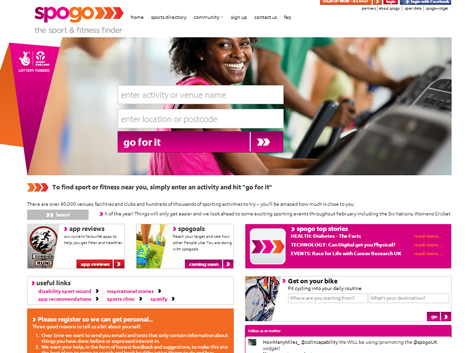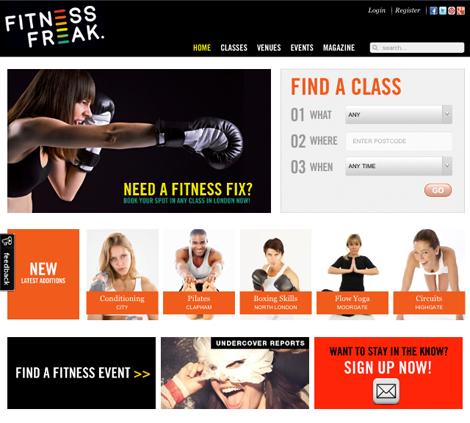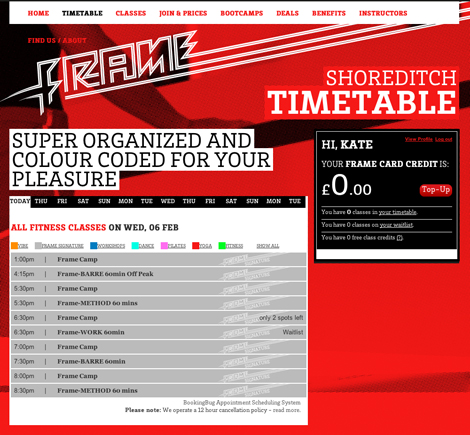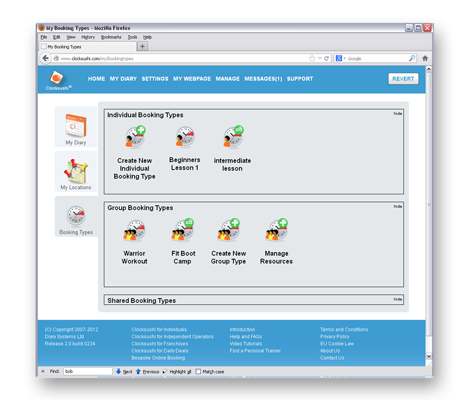“In some ways the physical activity industry is forward-thinking and advanced, and in other ways it’s a long way behind enabling the consumer to consume its product in the way they like to consume, which is to look online,” says John Tucker, director of strategy and partnerships at ukactive.
“If people are changing how they buy, then we need to change how we sell,” adds Neil Harmsworth, co-founder of payasUgym.com. “Increasingly people are buying online, and even if they don’t buy, they go online to do their research.”
However, 2011 research by communications agency McCann showed that, while most other industries were rated eight out of 10 for booking online, sport only managed three out of 10.
Consumer demand
As an extension of this need to tap into online buying processes, the fitness industry also needs to get more app-savvy. According to Luxury Institute 2012, 64 per cent of affluent app users say they view brands with mobile apps more favourably. Not only that, but time spent using mobile apps is starting to challenge TV viewing, with consumers spending 127 minutes a day on them.
And it’s not just about fitting in with customer demand: apps and booking websites offer great marketing opportunities for clubs and help ensure classes run at capacity, as well as cutting queues and freeing up reception staff to do other tasks. And with a proliferation of apps and booking websites to which clubs can subscribe for a reasonable fee, it’s easier than ever to offer customers the ability to book into classes online.
Pure Gym is one of the early adopters of an app: it has already launched an app for the iPhone, with an Android version to follow later this year. The app enables users to locate the nearest Pure Gym, book and cancel classes, refer friends and access fitness tips from personal trainers, as well as view instructional videos and other information.
The experience of Huntingdonshire District Council’s One Leisure also reflects the growing appetite for booking online. Three months after the soft launch of online booking at one of its five sites – a pilot that was carried out three years ago – 60 per cent of all class transactions were carried out and paid for online; online booking has now been rolled out to the rest of its sites. “As a business, online booking has helped us become more efficient, as well as reducing unpaid use,” says leisure systems co-ordinator Michelle Schwick. “For customers, it saves time as they can see at a glance what’s available and swap between sites if classes are full.”
Meanwhile online booking has enabled Sport Sheffield, the university’s sports offering, to re-allocate resources on-site. With bookings moving online, it was able to convert the now under-used reception area into a café, creating a secondary revenue stream. When the centre started receiving a growing number of complaints about busy reception desks and telephones not being answered, it introduced an additional 50p fee for booking in person, while freezing online prices. The result was a rise in online reservations to now account for 78 per cent of all bookings – and no more queues.
Facilitating class bookings online or via an app is something clubs need to consider to stay ahead of the curve.
We take a look at some of the options.
SPOGO
A Lottery-funded project led by ukactive, spogo currently lists 90,000 venues, making it the biggest aggregated database of venues in the UK. Its brief is to make finding and booking sport and exercise online as easy as booking a train ticket. Still in beta phase, not all venues offer online booking, but the number that do is growing all the time.
At the moment it doesn’t cost anything to be listed, but going forward commissions may be taken on bookings.
“spogo will give us a true insight into the customer journey,” says project director Richard Pearey. “We’ll be able to use the data to observe customer behaviour and use this to inform initiatives on how to get people active – another overarching aim of the site.”
FITNESS FREAK
Launched just before Christmas 2012, this booking site has hit the ground running, with 96 London venues on-board offering between 3,000 and 3,500 fitness classes a week.
Founder Shara Tochia wanted to launch the health and fitness equivalent of restaurant finder/booking website toptable.co.uk. Customers can search Fitness Freak for classes according to type of activity, area and time, and then book and pay online. Classes cost the same, or cheaper, than booking direct, and operators pay a 10 per cent commission per booking.
The site also has a lifestyle element to help build its client base, with a magazine section where resident journalist Booty Blogger reviews classes. There are also guest and user reviews.
A loyalty scheme is set to be launched soon, and Tochia is planning to take the concept to three more cities this year, with Manchester and Edinburgh currently on the list.
PAYASUGYM
Through payasUgym.com, people buy gym passes online and are sent a code, by SMS and email, to show at reception. One- and three-month passes are also offered. Operators pay a small commission on passes redeemed.
Currently 1,000 venues are listed – a number that’s growing all the time. The site was founded to allow flexible gym membership for those who travel, but co-founder Neil Harmsworth says people are actually using it to try gyms under the radar before joining. It has therefore proved a successful lead generator.
A new tie-up with Tesco Clubcard has taken payasUgym’s customer base to 16.5 million people, while a partnership with O2 means users get a priority message when they are near a registered gym. This year a new mobile site is being launched and the concept is being expanded overseas.
GYMSYNC
Brand new GymSync is a package that’s currently being trialled by a handful of independent health clubs in the UK. It’s self-managed by the gym and operates in real time: clubs input their own timetable and the system integrates with live bookings.
GymSync publishes timetables online and enables people to book into classes, put themselves on a reserve list and if necessary cancel their place. In the event of a cancellation, the next person on the reserve list automatically receives a notification, making booking into busy classes much easier.
The system works via a free app on smartphones; if people don’t have a smartphone, they can log in via the GymSync website and complete the process by email. The system also sends out reminders about the class and, if the instructor needs to cancel for some reason, this can be done instantaneously via a text box. Payment can’t yet be taken, but there are plans to add this facility at a later date.
Subscription to the service costs £30 per club per month. For operators, the benefit is that classes will be as full – and therefore as profitable – as possible. There’s also a reporting tool that can help measure the profitability of classes and inform timetabling.
CLOCKSUSHI
ClockSushi offers a booking system on a subscription basis for £49 a month per club, where people can book and pay online. It sends out confirmation emails and SMS reminders about the class.
The system can also be run with a POS till, so the website links with bookings taken on reception. A number of new features are currently in the development pipeline, including a reserve list.
BOOKING BUG
Booking Bug is a cloud-based booking system for clubs, meaning that the availability is always live, whether being viewed by admin or by clients looking for a class online.
For a monthly fee, Booking Bug enables online bookings to be taken and paid for, and sends out automated confirmations via email and SMS. The appearance of the booking page can be customised to look like the fitness club’s own website, and an app can be run alongside it.
Of further interest to operators, Booking Bug offers integrated marketing tools to develop and disseminate online and mobile marketing communications, and can administer promotions, offers, discounts and daily deals. There are also reporting tools to analyse data.
Prices start at £14.95 a month for personal trainers, rising to £49.95 for larger businesses with up to 20 ‘resources’ – such as swimming pool, gym, sports courts, etc.
GLADSTONE
Gladstone’s online booking module, Connect, works in real time with Gladstone’s Plus2 leisure management software, enabling customers to view, book and pay for classes, sports courts and courses, amend reservations, manage and renew memberships and sign up for direct debit.
Gladstone also offers an iPhone booking app, allowing members to make bookings that can also link to Facebook, allowing them to tell their friends what activity they have booked and where.
Many Gladstone customers have installed kiosks on-site to act in lieu of – or in addition to – reception. These kiosks also allow visitors to book sessions and buy money-saving multi-class packages. Tickets can also be collected from the kiosks for class bookings made online at home.
Connect also has a ‘dishonoured bookings’ functionality, introducing a £2 fine for no-shows. When South Lanarkshire Leisure and Culture introduced this, it led to a reduction in no-shows of around 35 per cent.
BIG WAVE APP
Big Wave Media has created an app that can be tailored for each facility, showing timetables and enabling class booking. Simon Beer, head of PR and digital services at Big Wave Media, says most operators are using this as a value-added service rather than charging for the app.
Big Wave Media charges a monthly fee of £225 for one facility; multiple sites get a discounted rate per site. As part of the package, there is an analytics suite, allowing operators to see how many people opened the app, viewed the timetable or booked a class.




























































